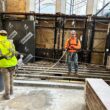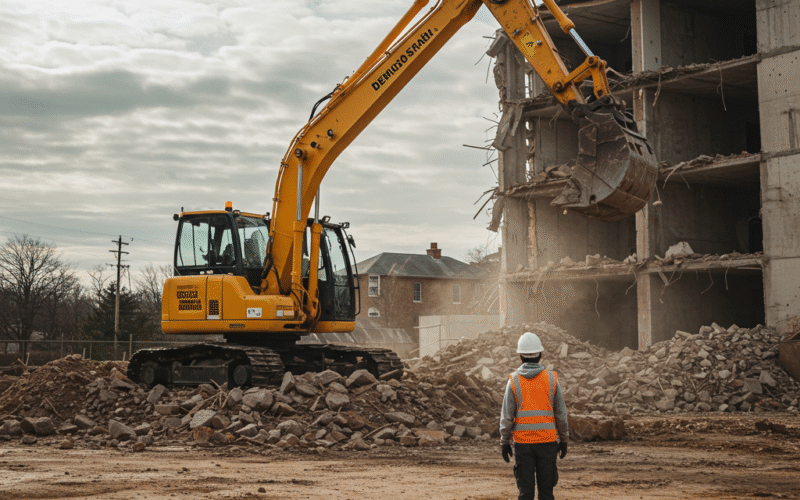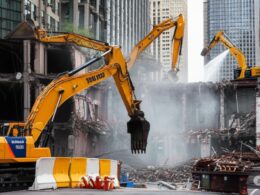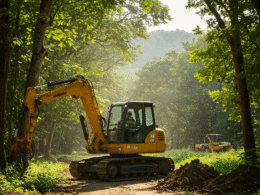Demolition projects require careful planning, expert execution, and strict compliance with safety and environmental regulations. Whether you’re renovating a property or clearing land for new construction, choosing the right demolition contractor is critical. Here’s your comprehensive guide to making an informed decision.
1. Understanding Different Types of Demolition Services
Demolition contractors offer various services tailored to different project needs:
✔ Complete Demolition: Total removal of structures
✔ Selective Demolition: Partial removal of specific building elements
✔ Interior Demolition: Removing non-load-bearing walls and fixtures
✔ Deconstruction: Carefully dismantling structures for material reuse
✔ Hazardous Material Removal: Asbestos, lead, or mold remediation
2. Essential Qualifications for Demolition Contractors
When evaluating potential contractors, verify these critical credentials:
Licensing and Insurance
- Valid state and local demolition licenses
- General liability insurance ($1 million minimum recommended)
- Workers’ compensation coverage
- Environmental compliance certifications
Experience and Specialization
- Minimum 5 years in demolition work
- Portfolio of similar projects
- Specialized equipment for different demolition types
Safety Compliance
- OSHA 30-Hour Certification for crews
- Documented safety training programs
- Incident rate below industry average
3. Required Permits and Approvals
Most demolition projects require multiple permits:
✔ Building Department Permit (primary demolition approval)
✔ Environmental Clearance (asbestos, lead, PCB testing)
✔ Utility Disconnection Certifications (gas, water, electric)
✔ Zoning Approvals (for historic districts or special zones)
✔ Dust Control Plan (for urban areas)
4. Key Questions to Ask Potential Contractors
Before signing any contract, get clear answers to these questions:
- What’s included in your bid?
- Debris removal and disposal
- Recycling fees
- Permit acquisition
- Site cleanup
- What safety measures do you implement?
- Dust suppression systems
- Noise control methods
- Vibration monitoring
- Traffic control plans
- What’s your waste management process?
- Recycling percentage
- Landfill diversion methods
- Hazardous material handling
- Can you provide references?
- Recent project examples
- Client testimonials
- Subcontractor relationships
- What’s your project timeline?
- Pre-demolition preparations
- Actual demolition duration
- Post-demolition cleanup
5. Warning Signs of Unreliable Contractors
Be cautious of contractors who:
🚩 Request full payment upfront
🚩 Provide vague or verbal contracts
🚩 Lack proper insurance documentation
🚩 Can’t explain permit acquisition process
🚩 Have no physical business address
🚩 Pressure for immediate decisions
6. Understanding the Demolition Process
A professional demolition typically follows these stages:
- Pre-Demolition Assessment
- Structural evaluation
- Hazardous material testing
- Utility disconnections
- Permitting and Approvals
- Securing all required documents
- Neighborhood notifications
- Site Preparation
- Safety barriers installation
- Equipment mobilization
- Dust control setup
- Actual Demolition
- Methodical structure takedown
- Material sorting and recycling
- Continuous safety monitoring
- Site Cleanup
- Final debris removal
- Grade and compact soil
- Final inspections
7. Cost Factors in Demolition Projects
Several elements influence demolition costs:
✔ Structure Size and Type (residential vs. commercial)
✔ Location and Accessibility (urban vs. rural sites)
✔ Hazardous Materials Present (asbestos, lead, mold)
✔ Material Recycling Requirements
✔ Permit and Disposal Fees
✔ Site Restoration Needs
8. Environmental Considerations
Responsible demolition contractors should:
♻️ Achieve 70-90% material recycling rates
🌱 Use low-emission equipment when possible
💧 Implement stormwater pollution prevention
🔇 Follow noise and dust abatement regulations
9. Post-Demolition Responsibilities
After demolition completion, verify:
✔ All debris has been properly removed
✔ The site is graded and stabilized
✔ All permits are properly closed
✔ You receive documentation of material disposal
10. Making Your Final Decision
When comparing contractors, consider:
✅ Experience with similar projects
✅ Transparency in pricing
✅ Commitment to safety
✅ Environmental responsibility
✅ Communication and professionalism
By carefully evaluating these factors, you’ll select a demolition contractor who will complete your project safely, efficiently, and in compliance with all regulations. Remember that the lowest bid isn’t always the best choice – quality, safety, and reliability should be your top priorities.








